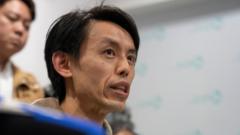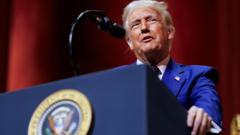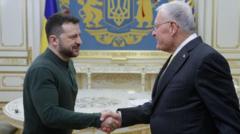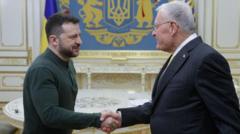In a pointed response to President Trump's recent remarks about the Ukraine conflict, President Zelensky urges honesty and dismisses the disinformation surrounding the war, emphasizing the need for Ukraine's participation in peace discussions.
Zelensky Criticizes Trump's Disinformation on Ukraine War

Zelensky Criticizes Trump's Disinformation on Ukraine War
Ukrainian President Volodymyr Zelensky calls for truthfulness regarding the ongoing war, countering Trump's claims.
In a recent press conference, President Volodymyr Zelensky of Ukraine directly criticized former President Donald Trump for suggesting that Ukraine initiated the ongoing war with Russia. Zelensky, speaking from his fortified office in Kyiv, stated that Trump was "living in a disinformation space," reflecting his disbelief about the accuracy of Trump's claims regarding the war's origins.
Zelensky's comments were made amidst ongoing peace negotiations between the Trump administration and Russia, which notably excluded Ukrainian participation—an issue Zelensky vehemently opposed. He articulated a strong desire for the U.S. leadership to engage with Ukraine more truthfully and transparently.
At the heart of Zelensky's remarks was a rejection of Trump's assertion that the war could have been avoided if Ukraine had acted differently. In a recent statement, Trump implied, “You should have never started it,” aligning himself with a longstanding Russian narrative that advocates for certain preconditions before negotiations can progress. This includes demands for elections in Ukraine, which currently remain suspended due to ongoing martial law following Russia’s full-scale invasion launched in February 2022.
Zelensky firmly rebuffed Trump's assertion that his administration’s approval rating was down to a mere 4 percent, pointing to various polls that paint a more favorable image of his leadership. During his comments, he maintained a composed demeanor and emphasized that he was not intimidated by the diplomatic challenges posed by the Trump administration.
He remarked that Russia seemed to be quite pleased with the recent trajectory of discussions, implying that the manner of dialogue was tilting towards leniency towards Russian perspectives. Zelensky highlighted that it was unprecedented for U.S. diplomats to discuss Russia as victims in this context, calling attention to the broader implications of such narratives given the war's tragic toll, which has left around one million people dead or injured on both sides.
The dynamic of these discussions underscores the delicate interplay of international diplomacy, national integrity, and historical accountability as Ukraine continues to navigate its role within the global conflict instigated by Russia's aggression.
As the situation evolves, Zelensky's call for clarity stands as a crucial reminder of the responsibilities that wartime dialogue holds, both in terms of honesty and the necessity for inclusivity in negotiation processes involving the affected nations.
Zelensky's comments were made amidst ongoing peace negotiations between the Trump administration and Russia, which notably excluded Ukrainian participation—an issue Zelensky vehemently opposed. He articulated a strong desire for the U.S. leadership to engage with Ukraine more truthfully and transparently.
At the heart of Zelensky's remarks was a rejection of Trump's assertion that the war could have been avoided if Ukraine had acted differently. In a recent statement, Trump implied, “You should have never started it,” aligning himself with a longstanding Russian narrative that advocates for certain preconditions before negotiations can progress. This includes demands for elections in Ukraine, which currently remain suspended due to ongoing martial law following Russia’s full-scale invasion launched in February 2022.
Zelensky firmly rebuffed Trump's assertion that his administration’s approval rating was down to a mere 4 percent, pointing to various polls that paint a more favorable image of his leadership. During his comments, he maintained a composed demeanor and emphasized that he was not intimidated by the diplomatic challenges posed by the Trump administration.
He remarked that Russia seemed to be quite pleased with the recent trajectory of discussions, implying that the manner of dialogue was tilting towards leniency towards Russian perspectives. Zelensky highlighted that it was unprecedented for U.S. diplomats to discuss Russia as victims in this context, calling attention to the broader implications of such narratives given the war's tragic toll, which has left around one million people dead or injured on both sides.
The dynamic of these discussions underscores the delicate interplay of international diplomacy, national integrity, and historical accountability as Ukraine continues to navigate its role within the global conflict instigated by Russia's aggression.
As the situation evolves, Zelensky's call for clarity stands as a crucial reminder of the responsibilities that wartime dialogue holds, both in terms of honesty and the necessity for inclusivity in negotiation processes involving the affected nations.


















